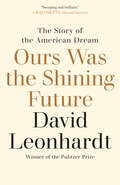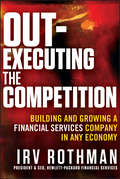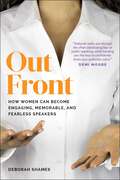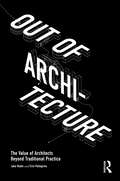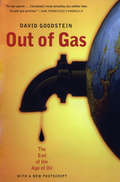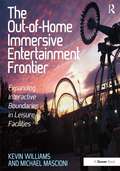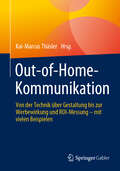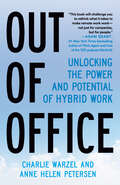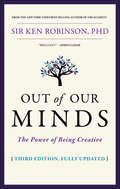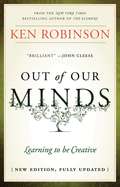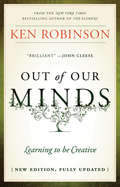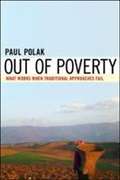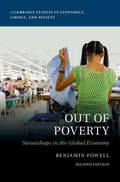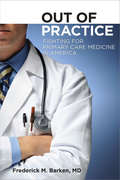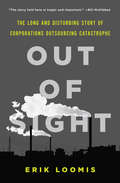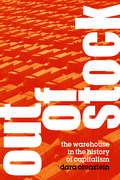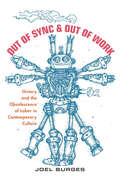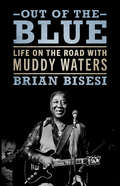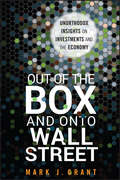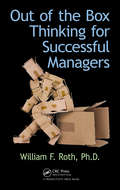- Table View
- List View
Ours Was the Shining Future: The Story of the American Dream
by David LeonhardtThe clear-eyed, definitive history of the modern American economy and the decline of the American Dream, from the Pulitzer Prize–winning columnist behind The New York Times's &“The Morning&” newsletter.&“With the even-handed incisiveness that has made him one of the country&’s most-respected voices on economics, David Leonhardt illuminates the inside history of the players and missteps that have stolen so many Americans&’ futures.&”—Jane Mayer, author of Dark MoneyTwo decades into the twenty-first century, the stagnation of living standards has become the defining trend of American life. Life expectancy has declined, economic inequality has soared, and, after some progress, the Black-white wage gap is once again as large as it was in the 1950s. How did this happen in the world&’s most powerful country? And what happened to the &“American dream&”—the promise of a happier, healthier, more prosperous future—which was once such an inextricable part of our national identity?Drawing on decades of writing about the economy for The New York Times, Pulitzer Prize–winning writer David Leonhardt examines the past century of American history, from the Great Depression to today&’s Great Stagnation, in search of an answer.To make sense of the rise and subsequent fall of the American dream, Leonhardt tells the story of the modern American economy as an ongoing battle between two competing forms of capitalism: one that envisions prosperity for most, and one that serves the individual and favors the wealthy. In vivid prose, Ours Was the Shining Future traces how democratic capitalism flourished to make the American dream possible, until the latter decades of the twentieth century when, bit by bit, the dream was corrupted to serve only the privileged few.Ours Was the Shining Future is a sweeping narrative full of innovation and grit, human drama and hope. Featuring the trailblazing figures who helped shape the American dream—Frances Perkins, Paul Hoffman, Cesar Chavez, Robert Kennedy, A. Philip Randolph, Grace Hopper, and more—this engaging history reveals the power of grassroots democratic movements from across the political spectrum. And though the American dream feels lost to us now, Leonhardt shows how Americans—if they commit themselves to transforming the economy, as they did in the past—have the power to revive the dream once more.
OurSpace: Resisting the Corporate Control of Culture
by Christine HaroldWhen reporters asked about the Bush administration&’s timing in making their case for the Iraq war, then Chief of Staff Andrew Card responded that &“from an marketing point of view, you don&’t introduce new products in August.&” While surprising only in its candor, this statement signified the extent to which consumer culture has pervaded every aspect of life. For those troubled by the long reach of the marketplace, resistance can seem futile. However, a new generation of progressive activists has begun to combat the media supremacy of multinational corporations by using the very tools and techniques employed by their adversaries. In OurSpace, Christine Harold examines the deployment and limitations of &“culture jamming&” by activists. These techniques defy repressive corporate culture through parodies, hoaxes, and pranks. Among the examples of sabotage she analyzes are the magazine Adbusters&’ spoofs of familiar ads and the Yes Men&’s impersonations of company spokespersons. While these strategies are appealing, Harold argues that they are severely limited in their ability to challenge capitalism. Indeed, many of these tactics have already been appropriated by corporate marketers to create an aura of authenticity and to sell even more products. For Harold, it is a different type of opposition that offers a genuine alternative to corporate consumerism. Exploring the revolutionary Creative Commons movement, copyleft, and open source technology, she advocates a more inclusive approach to intellectual property that invites innovation and wider participation in the creative process. From switching the digital voice boxes of Barbie dolls and G.I. Joe action figures to inserting the silhouetted image of Abu Ghraib&’s iconic hooded and wired victim into Apple&’s iPod ads, high-profile instances of anticorporate activism over the past decade have challenged, but not toppled, corporate media domination. OurSpace makes the case for a provocative new approach by co-opting the logic of capitalism itself. Christine Harold is assistant professor of speech communication at the University of Georgia.
Out-Executing the Competition: Building and Growing a Financial Services Company in Any Economy
by Irving H. RothmanAn inside look at what makes a successful financial services company Irv Rothman may not have considered a career in the financial services early on, but he ended up in leadership positions at AT&T, Compaq and, for over a decade, Hewlett-Packard. His consistent record of success and insider perspective make him the perfect guide to the art of building and growing a financial services company, and in Out-Executing the Competition he shares his remarkable story and years of experience, giving readers a glimpse into his numerous accomplishments and providing takeaways they can apply to their own companies, whatever the industry. An engaging and lively account of Rothman's career focusing on his work at financial services companies during some of the most economically challenging periods of the past thirty years, the book explores the methods and tactics he used to help his companies not only weather financial uncertainty, but to thrive. Tells the story of financial services company expert Irv Rothman, in his own words Includes invaluable insights into how to build a financial services company that can survive and thrive in even the toughest economic climate Helps readers working at financial services companies and in other industries to construct solid businesses that can outperform their competition Part biography, part how-to guide, Out-Executing the Competition is the ultimate inside look at building a financial services company that's sure to succeed.
Out Front: How Women Can Become Engaging, Memorable, and Fearless Speakers
by Deborah ShamesYour Voice Is Your Power—Now Make It Heard More than ever before, the business, entertainment, and political landscapes are ripe for women to accomplish their goals. Women are entering law, medical, and graduate schools in equal numbers to men. But it's still a challenge to make it to the top. Developing excellent communication and public speaking skills gives women the ability to rise to their full potential, seize every opportunity, and realize their aspirations. Whether pitching for new business, delivering a talk at a conference, raising money for a non-profit, or communicating one-on-one with coworkers, women can become effective, powerful communicators when they speak with authenticity and confidence. Deborah Shames, a veteran speaker and master trainer with 18 years of experience coaching high-level executives and celebrities, invites women to step up and be heard. Noting the perfection syndrome and negative self-talk that plague many women, Deborah delivers a how-to for battling these demons and identifies women's special talents—from high emotional intelligence and leadership skills to storytelling. She guides readers in the mechanics of communicating efficiently and constructing successful presentations, even with pressing deadlines. Out Front is the definitive book for every woman who wants to engage an audience and expand her influence, whatever the venue or challenge.
Out of Architecture: The Value of Architects Beyond Traditional Practice
by Jake Rudin Erin PellegrinoOut of Architecture is both a call to reassess the architecture profession and its education, and a toolkit for graduates and working architects to untangle their skills, passions, and value from traditional architectural practice and consider alternate pathways. Written by design professionals and expert career consultants, this book is informed by numerous client accounts as well as the authors’ own stories and routes out of architecture. The initial chapters follow the narrative of a typical architecture training in the US, highlighting the many highs and lows, skills honed, and ultimately the huge disconnect that can occur between architectural education and practice. Subsequent chapters explore a disillusionment with the profession, unhealthy work cultures, mentorship, working with lead architects, toxic perfectionism, and the notion of a “calling.” Authors then present the hopeful accounts of many architects who escaped a profession known for its grueling working conditions to find fulfilling, well-paying, creative jobs that better utilize the skills of architecture than the architectural profession itself. Written in a unique combination of storytelling and analysis, this patchwork of client and author stories makes for an immersive, provocative, and enjoyable read. A wide range of architecture students, graduates, educators, and professionals will recognize themselves within the pages of this book and find prompts to reassess their working practices, teaching styles, and the profession itself. It will be of particular value to those students skeptical of joining the architecture workforce, as well as those further along and considering a career change.
Out of Combat: Changing the Game--Finding Balance in Difficult Conversations
by Holly WeeksBecause a combat conversation is a struggle between winning and losing, it has to be unbalanced. We must change the game and move away from the combat model of difficult conversation to one with better odds of working well and inflicting less damage. We should prepare for conversations by working out our preferred outcome, preferred working relationship, and interferences. This will keep us realistic and strategically focused on the situation we have and the one we want.
Out of Emotion's Grip: Increasing Skill--Four Tactics You Can Use to Manage Disruptive Emotions During Difficult Conversations
by Holly WeeksWhen handling toxic conversations, we need to add real skill to prevent our emotions from interfering. In this chapter, the author outlines four tactics that can help: finding the middle ground between emotional extremes, immunizing ourselves against thwarting ploys, changing tack, and recovering from mistakes. She uses anecdotes to illustrate how events might play out in real life.
Out of Gas: The End of the Age of Oil
by David GoodsteinScience tells us that an oil crisis is inevitable. Why and when? And what will our future look like without our favorite fuel? Our rate of oil discovery has reached its peak and will never be exceeded; rather, it is certain to decline--perhaps rapidly--forever forward. Meanwhile, over the past century, we have developed lifestyles firmly rooted in the promise of an endless, cheap supply. In this book, David Goodstein, professor of physics at Caltech, explains the underlying scientific principles of the inevitable fossil fuel shortage we face. He outlines the drastic effects a fossil fuel shortage will bring down on us. And he shows that there is an important silver lining to the need to switch to other sources of energy, for when we have burned up all the available oil, the earth's climate will have moved toward a truly life-threatening state. With its easy-to-grasp explanations of the science behind every aspect of our most urgent environmental policy decisions, Out of Gas is a handbook for the future of civilization.
The Out-of-Home Immersive Entertainment Frontier: Expanding Interactive Boundaries in Leisure Facilities
by Kevin Williams Michael MascioniDigital Out of Home Entertainment is rather an arcane description for one of the fastest growing technology-sectors. These forms of interactive technology, often established on a 'pay per use' basis are transforming the customer experience in shops, cinemas, museums; almost any environment where consumers are congregating. Kevin Williams and Michael Mascioni's The Out-of-Home Immersive Entertainment Frontier provides a 'state of play' exploration of the successes, the emerging new applications and the strategies that inform them. The authors interviewed nearly 70 leading executives from many familiar organisations in every facet of the digital out-of-home entertainments industry. The result is an essential guide for entertainment executives as well as those involved in retailing, the hotel industry, mobile communications, museums and heritage.
Out-of-Home-Kommunikation: Von der Technik über Gestaltung bis zur Werbewirkung und ROI-Messung – mit vielen Beispielen
by Kai-Marcus ThäslerDieses Buch erläutert die Wirkweise von Out-of-Home (OOH)-Kampagnen und zeigt dessen Mehrwert in der Kommunikations-Planung von Unternehmen, Mediaagenturen und der öffentlichen Hand auf. Es richtet sich an Marketing-Entscheider, Werbungtreibende, Designer, Media- und Werbeagenturen sowie kommunale Entscheidungsträger. Die Autoren – allesamt ausgewiesene Experten, Macher und Vordenker der OOH-Kommunikation – durchleuchten die komplexen ästhetischen, kommunikativen und wirtschaftlichen Zusammenhänge. Sie erläutern die Chancen der Außenwerbung und zeigen die neuen Möglichkeiten im Rahmen des Digital Marketings. Der inhaltliche Bogen spannt sich von kreativen Aspekten bis zu technischen Themen. Ein wesentliches Thema ist die Leistungserfassung und Messung der Wirkung von Out-of-Home-Werbung. Ein einleitender historischer Überblick über die Plakatwerbung von Mitte des 19. Jahrhunderts bis heute zeigt, wie prägend die OOH-Kommunikation immer schon war.Auszug aus dem Inhalt Der Flirt der Werbung mit den Konsumenten – wie Außenwerbung wahrgenommen wirdTop-Kreationen von Out of Home-MotivenGeschäftsmodelle, Pachtverträge, kommunale und private PachtgeberOut of Home im Spannungsfeld zwischen Branding und Sales-Activation Dynamische Leistungswerterfassung für digitale Out of Home-Medien – die Public & Private Screens StudieDie Messung der Wirkung von Out-of-Home-Werbung Digitale Außenwerbung zwischen Massenmedium, Mikrotargeting und Data Driven MarketingDie OOH-Medien als elementarer Teil der Stadtkommunikation und -infrastrukturMit Beiträgen vonJulius Baum, Fachverband Aussenwerbung e. V.Judith Behmer, rheingold GmnH & Co.KGRob Brünig, schoepfung GmbH Sebastian Buggert, rheingold GmnH & Co.KGJan Otto Buh, ISBA Informatik Service-Gesellschaft mbHDirk Engel, Unabhängiger Markt- und MedienforscherThorsten Gabriel, MindshareDr. Frank Goldberg, Institute for Digital Out of Home Media GmbHRené Grohnert, Deutsches Plakat Museum im Museum FolkwangGrant Guesdon, Out Door Media AssociationDr. Petra Henker, Wall Decaux Premium Out of HomeDirk Lüger, Weischer.GeoConsult GmbH & CO KGTerence Lutz, Haley IntelligenceSiegfried Marter, Geschäftsführer bei Moplak Medien Service GmbHPD Dr. habil. Tino Meitz, Cognitive Media Research LABFelix H. Mende, Swiss Poster Research Plus AGSusanne Patschicke, Ferrero Deutschland GmbHProf. Dr. Alexander, Preuß Annalect GermanyGeorg Schotten, Ströer Core GmbHUwe Storch, Ferrero Deutschland GmbHClaudia Zayer, Goldbach Germany GmbH
Out of Office: The Big Problem and Bigger Promise of Working from Home
by Anne Helen Petersen Charlie WarzelThe future isn&’t about where we will work, but how. For years we have struggled to balance work and life, with most of us feeling overwhelmed and burned out because our relationship to work is broken. This &“isn't just a book about remote work. It's a book that helps us imagine a future where our lives—at the office and home—are happier, more productive, and genuinely meaningful&” (Charles Duhigg, bestselling author of The Power of Habit).Out of Office is a book for every office worker – from employees to managers – currently facing the decision about whether, and how, to return to the office. The past two years have shown us that there may be a new path forward, one that doesn&’t involve hellish daily commutes and the demands of jam-packed work schedules that no longer make sense. But how can we realize that future in a way that benefits workers and companies alike? Based on groundbreaking reporting and interviews with workers and managers around the world, Out of Office illuminates the key values and questions that should be driving this conversation: trust, fairness, flexibility, inclusive workplaces, equity, and work-life balance. Above all, they argue that companies need to listen to their employees – and that this will promote, rather than impede, productivity and profitability. As a society, we have talked for decades about flexible work arrangements; this book makes clear that we are at an inflection point where this is actually possible for many employees and their companies. Out of Office is about so much more than zoom meetings and hybrid schedules: it aims to reshape our entire relationship to the office.
Out of Office: Ditch the 9-5 and Be Your Own Boss
by Fiona ThomasThe freelance industryis the fastest growing segment of the UK economy (seeing a 31% rise in 2019 and an anticipated rise of 50% in 2020), and people's desire for a work/life balance is at an all-time high. Out of Office offers a new possibility outside the 9-5 vacuum to become a successful and happy freelancer.Fiona's no-nonsense guide addresses the questions that people might feel too embarrassed to ask... like how to raise an invoice, register with HMRC, submit a tax return, claim expenses, network, and use social media. She also details why working from home is proven to have a positive impact on productivity and mental health, and why so many women are making the leap into freelancing out of necessity.Filled with with must-have information, helpful check-ins, and a strong focus on understanding the whys just as much as the hows, Out of Office will help you dive into freelance life and push you to the next level, while making sure you're taking time to reflect on your business and state of mind.
Out of Our Minds: The Power of Being Creative
by Ken RobinsonKen Robinson argues that organisations everywhere are trying to fix a problem that originates in schools and universities: "It is often said that education and training are the keys to the future. They are, but a key can be turned in two directions. Turn it one way and you lock resources away, even from those they belong to. Turn it the other way and you release resources and give people back to themselves. To realize our true creative potential¯in our organizations, in our schools and in our communities—we need to think differently about ourselves and to act differently towards each other. We must learn to be creative."—Ken Robinson The updated 3rd edition features a new introduction, modernized case studies, updated demographics and revised sections around technological developments and recent changes to the education system.
Out of Our Minds: Learning to be Creative
by Ken RobinsonOut of Our Minds is about why creativity matters so much, why people think they are not creative, how we arrived at this point, and what we can do about it.
Out of Our Minds
by Ken Robinson"It is often said that education and training are the keys to the future. They are, but a key can be turned in two directions. Turn it one way andyou lock resources away, even from those they belong to. Turn it the otherway and you release resources and give people back to themselves. To realizeour true creative potential--in our organizations, in our schools and in our communities--we need to think differently about ourselves and to actdifferently towards each other. We must learn to be creative."--Ken RobinsonPRAISE FOR OUT OF OUR MINDS"Ken Robinson writes brilliantly about the different ways in which creativity is undervalued and ignored . . . especially in our educational systems."--John Cleese"Out of Our Minds explains why being creative in today'sworld is a vital necessity. This book is not to be missed."--Ken Blanchard, co-author of The One-minute Manager and The Secret"If ever there was a time when creativity was necessary for the survival andgrowth of any organization, it is now. This book, more than any other I know, providesimportant insights on how leaders can evoke and sustain those creative juices."--Warren Bennis, Distinguished Professor of Business, University of Southern California; Thomas S. Murphy Distinguished Rresearch Fellow, Harvard Business School; Best-selling Author, Geeks and Geezers"All corporate leaders should read this book."--Richard Scase, Author and Business Forecaster"This really is a remarkable book. It does for human resources what Rachel Carson's Silent Spring did for the environment."--Wally Olins, Founder, Wolff-olins"Books about creativity are not always creative. Ken Robinson's is a welcome exception"--Mihaly Csikszentmihalyi, c.s. and d.j. Davidson Professor of Psychology, Claremont Graduate University; Director, Quality of Life Research Center; Best-selling Author, Flow"The best analysis I've seen of the disjunction between the kinds of intelligence that we have traditionally honored in schools and the kinds ofcreativity that we need today in our organizations and our society."--Howard Gardner, a. hobbs professor in cognition and education, Harvard Graduate School of Education, Best-selling Author, Frames of Mind
Out of Poverty: What Works When Traditional Approaches Fail
by Paul PolakPolak explodes what he calls the "Three Great Poverty Eradication Myths": that we can donate people out of poverty, that national economic growth will end poverty, and that Big Business, operating as it does now, will end poverty.
Out of Poverty: Sweatshops in the Global Economy (Cambridge Studies in Economics, Choice, and Society)
by Benjamin PowellOut of Poverty provides a comprehensive defence of Third World sweatshops that does not put economic efficiency over people, but instead explores methods of improving the welfare of those in Third World countries. The author explains how sweatshops provide the best opportunity for workers; and how they play an important role in development, leading to better wages and working conditions. Using economic theory, empirical evidence, and historical investigation, Powell argues that the anti-sweatshop movement would harm the very workers it intends to help by creating less-desirable alternatives and undermining development. Including a new chapter on the 2013 Rana Plaza factory collapse in Bangladesh, this revised and expanded second edition also explores how sweatshop wages have changed and how poverty alleviation has progressed in countries with sweatshops in the late 1990s and early 2000s and how boycotting Uyghur forced labor in China differs other sweatshop boycotts.
Out of Poverty
by Benjamin PowellThis book provides a comprehensive defense of third-world sweatshops. It explains how these sweatshops provide the best available opportunity to workers and how they play an important role in the process of development that eventually leads to better wages and working conditions. Using economic theory, the author argues that much of what the anti-sweatshop movement has agitated for would actually harm the very workers they intend to help by creating less desirable alternatives and undermining the process of development. Nowhere does this book put "profits" or "economic efficiency" above people. Improving the welfare of poorer citizens of third world countries is the goal, and the book explores which methods best achieve that goal. Out of Poverty will help readers understand how activists and policy makers can help third world workers.
Out of Practice: Fighting for Primary Care Medicine in America (The Culture and Politics of Health Care Work)
by Frederick M. BarkenPrimary care medicine, as we know and remember it, is in crisis. While policymakers, government administrators, and the health insurance industry pay lip service to the personal relationship between physician and patient, dissatisfaction and disaffection run rampant among primary care doctors, and medical students steer clear in order to pursue more lucrative specialties. Patients feel helpless, well aware that they are losing a valued close connection as health care steadily becomes more transactional than relational. The thin-margin efficiency, rapid pace, and high volume demanded by the new health care economics do not work for primary care, an inherently slower, more personal, and uniquely tailored service. In Out of Practice, Dr. Frederick Barken juxtaposes his personal experience with the latest research on the transformations in the medical field. He offers a cool critique of the "market model of medicine" while vividly illustrating how the seemingly inexorable trend toward specialization in the last few decades has shifted emphasis away from what was once the foundation of medical practice. Dr. Barken addresses the complexities of modern practice—overuse of diagnostic studies, fragmentation of care, increasing reliance on an array of prescription drugs, and the practice of defensive medicine. He shows how changes in medicine, the family, and society have left physicians to deal with a wide range of geriatric issues, from limited mobility to dementia, that are not addressed by health care policy and are not entirely amenable to a physician’s prescription. Indeed, Dr. Barken contends, the very survival of primary care is in jeopardy at a time when its practitioners are needed more than ever. Illustrated with case studies gleaned from more than twenty years in private practice and data from a wide range of sources, Out of Practice is more than a jeremiad about a broken system. Throughout, Dr. Barken offers cogent suggestions for policymakers and practitioners alike, making clear that as valuable as the latest drug or medical device may be, a successful health care system depends just as much on the doctor-patient relationship embodied by primary care medicine.
Out of Sight: The Long and Disturbing Story of Corporations Outsourcing Catastrophe
by Erik LoomisA provocative analysis of labor, globalization, and environmental harm by the award-winning historian and author of A History of America in Ten Strikes. In the current state of our globalized economy, corporations have no incentive to protect their workers or the environment. Jobs moves seamlessly across national borders while the laws that protect us from rapacious behavior remain bound by them. As a result, labor exploitation and toxic pollution remain standard practice. In Out of Sight, Erik Loomis—a historian of both the labor and environmental movements—follows a narrative that runs from the 1911 Triangle Shirtwaist Factory fire in New York City to the collapse of the Rana Plaza factory outside of Dhaka, Bangladesh, in 2013. He demonstrates that our modern systems of industrial production are just as dirty and abusive as they were during the Industrial Revolution and the Gilded Age. The only difference is that the ugly side of manufacturing is now hidden in faraway places where workers are most vulnerable. In this Choice Outstanding Academic Title, Loomis shows that the great environmental victories of twentieth-century America—the Clean Water Act, the Clean Air Act, the EPA—were actually union victories. Using this history as a call to action, Out of Sight proposes a path toward regulations that follow corporations wherever they do business, putting the power back in workers&’ hands. &“The story told here is tragic and important.&” —Bill McKibben &“Erik Loomis prescribes how activists can take back our country—for workers and those who care about the health of our planet.&” —Senator Sherrod Brown (D-OH)
Out of Stock: The Warehouse in the History of Capitalism
by Dara OrensteinIn Out of Stock, Dara Orenstein delivers an ambitious and engrossing account of that most generic and underappreciated site in American commerce and industry: the warehouse. She traces the progression from the nineteenth century’s bonded warehouses to today’s foreign-trade zones, enclaves where goods can be simultaneously on US soil and off US customs territory. Orenstein contends that these zones—nearly 800 of which are scattered across the country—are emblematic of why warehouses have begun to supplant factories in the age of Amazon and Walmart. Circulation is so crucial to the logistics of how and where goods are made that it is increasingly inseparable from production, to the point that warehouses are now some of the most pivotal spaces of global capitalism. Drawing from cultural geography, cultural history, and political economy, Out of Stock nimbly demonstrates the centrality of warehouses for corporations, workers, cities, and empires.
Out of Sync & Out of Work: History and the Obsolescence of Labor in Contemporary Culture
by Joel BurgesOut of Sync & Out of Work explores the representation of obsolescence, particularly of labor, in film and literature during a historical moment in which automation has intensified in capitalist economies. Joel Burges analyzes texts such as The Invention of Hugo Cabret, Wreck-It Ralph, Fantastic Mr. Fox, and Iron Council, and examines their “means” of production. Those means include a range of subjects and narrative techniques, including the “residual means” of including classic film stills in a text, the “obstinate means” of depicting machine breaking, the “dated means” of employing the largely defunct technique of stop-motion animation, and the “obsolete” means of celebrating a labor strike. In every case, the novels and films that Burges scrutinizes call on these means to activate the reader’s/viewer’s awareness of historical time. Out of Sync & Out of Work advances its readers’ grasp of the complexities of historical time in contemporary culture, moving the study of temporality forward in film and media studies, literary studies, critical theory, and cultural critique.
Out of the Blue: Life on the Road with Muddy Waters (American Made Music Series)
by Brian BisesiOut of the Blue: Life on the Road with Muddy Waters begins with a moment lifted from a young musician’s dreams. Brian Bisesi, a guitarist barely out of his teens, is invited on stage to fill in for a missing member of the band backing blues legend Muddy Waters. This life-changing quirk of fate opens the door into a world of challenges and opportunities that Bisesi, an Italian American reared in the comforts of a New York City suburb, can barely imagine. Despite their differences, Bisesi and Waters hit it off, and what might have been a one-night stand turns into a career. From 1978 to 1980, Bisesi works for Waters as his road manager, bean-counter, and at times his confidant, while often sitting in with the band. Bisesi’s years with the band take him to Europe, Japan, Canada, and across the United States as Waters tours—and parties—with rock gods like Eric Clapton, the Rolling Stones, a Beatle, and the gamut of musicians who came of age with Waters and introduced a younger generation to the blues. In Out of the Blue, Bisesi captures it all: from the pranks and tensions among bluesmen enduring a hard life on the road, to observations about Waters’s technique, his love of champagne and reefer, his eye for women, and his sometimes-acrid views of contemporary music. Bisesi has sharp insights into the ill-conceived management decisions that led to the dissolution of Waters’s longest-serving band in June of 1980. This book will rivet, amuse, and occasionally infuriate blues aficionados. It is a raucous and intimate portrait of the blues scene at a pivotal moment in time that fascinates music historians and blues fans alike.
Out of the Box and Onto Wall Street
by Mark J. GrantA guide to thinking outside the Wall Street box Part memoir, part investment strategy guide, Out of the Box and onto Wall Street presents a revolutionary, alternative look at the world of finance. Revealing the essential rules for preserving capital and making long-term profits, the book provides timely observations on the current and future state of the world economy and investment markets, which are sure to be of interest to anyone considering alternative and time proven ways of making money. Written by Mark J. Grant, Managing Director of Corporate Syndicate and Structured Products for Southwest Securities, Inc Provides observations on the current and future state of the world economy and investment markets Offers detailed analysis of investment trends, common investor mistakes, and the simple investment strategies that most people are unaware of Designed for professional managers but also applicable for use by individual investors wanting a better understanding of the economy and how to pick smart investments for their own portfolio This is a must-read for anyone who wants to think about investing outside the Wall Street box.
Out of the Box Thinking for Successful Managers
by William F. RothDuring the author‘s decades of experience consulting in the corporate world and teaching management theory at the university level, he has often questioned many modern-day management practices. For example, why do so many companies have evaluation and reward systems that force employees to compete against each other while these same organizations p
